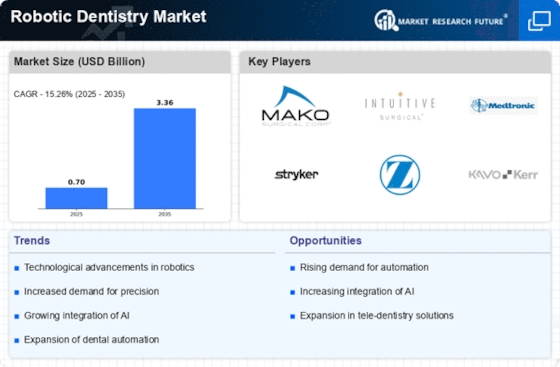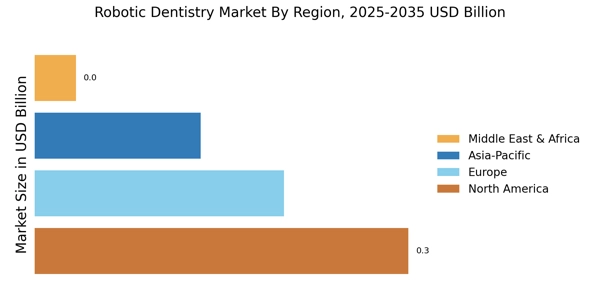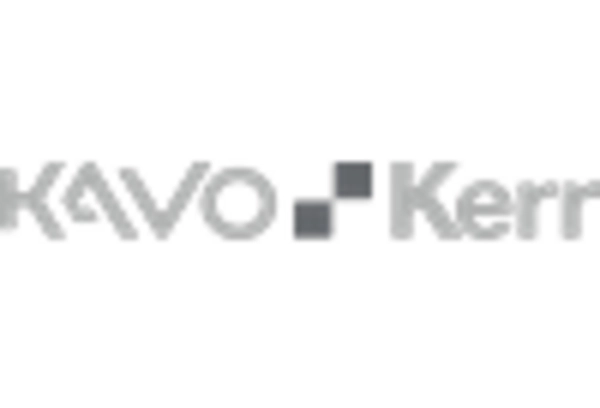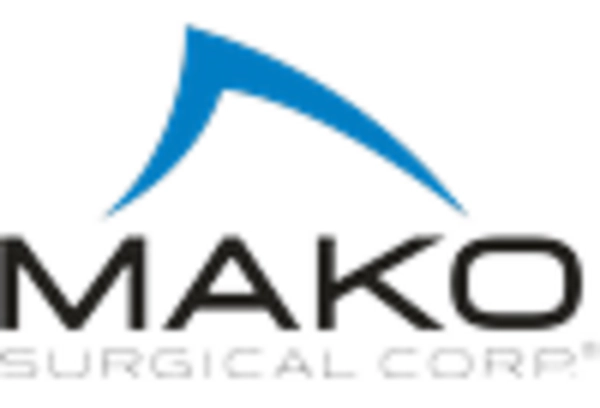Increased Focus on Patient Safety
Patient safety remains a paramount concern within the healthcare sector, and the Robotic Dentistry Market is no exception. The implementation of robotic systems in dental practices is associated with reduced risks of complications during procedures. These systems are designed to enhance precision, thereby minimizing the likelihood of errors that can lead to adverse outcomes. Data suggests that practices utilizing robotic technologies report lower rates of post-operative complications, which is a compelling factor for both practitioners and patients. As awareness of patient safety continues to grow, the Robotic Dentistry Market is expected to expand, driven by the need for safer and more reliable dental care solutions.
Growing Investment in Dental Robotics
Investment in dental robotics is on the rise, significantly impacting the Robotic Dentistry Market. Venture capital and private equity firms are increasingly funding startups and established companies that focus on developing robotic solutions for dental applications. This influx of capital is facilitating research and development, leading to the introduction of innovative products and services. Market forecasts indicate that the investment in dental robotics could reach several billion dollars within the next few years, reflecting the industry's potential for growth. As financial backing strengthens, the Robotic Dentistry Market is likely to evolve rapidly, fostering advancements that could redefine dental practices.
Rising Demand for Aesthetic Dentistry
The Robotic Dentistry Market is witnessing a notable increase in the demand for aesthetic dental procedures. Patients are increasingly seeking cosmetic enhancements, which require precision and skill that robotic systems can provide. The integration of robotics in aesthetic dentistry allows for more intricate procedures, such as veneers and implants, to be performed with greater accuracy. Market analysis indicates that the aesthetic dentistry segment is expected to account for a substantial share of the overall dental market, further propelling the growth of the Robotic Dentistry Market. As consumer preferences shift towards aesthetic improvements, the adoption of robotic technologies in dental practices is likely to rise, enhancing the overall patient experience.
Technological Advancements in Robotics
The Robotic Dentistry Market is experiencing a surge in technological advancements, which enhances the precision and efficiency of dental procedures. Innovations such as artificial intelligence and machine learning are being integrated into robotic systems, allowing for improved diagnostics and treatment planning. According to recent data, the market for dental robotics is projected to grow at a compound annual growth rate of approximately 20% over the next five years. This growth is driven by the increasing demand for automated solutions that can reduce human error and improve patient outcomes. As dental practices adopt these advanced technologies, the Robotic Dentistry Market is likely to witness a significant transformation, leading to enhanced service delivery and patient satisfaction.
Expansion of Dental Robotics Education and Training
The expansion of education and training programs in dental robotics is a crucial driver for the Robotic Dentistry Market. As robotic technologies become more prevalent in dental practices, there is a growing need for dental professionals to acquire the necessary skills to operate these systems effectively. Educational institutions and professional organizations are increasingly offering specialized training programs that focus on robotic dentistry. This trend not only enhances the skill set of dental practitioners but also promotes the adoption of robotic systems in clinical settings. As more professionals become proficient in robotic technologies, the Robotic Dentistry Market is expected to see accelerated growth, driven by a well-trained workforce.

















